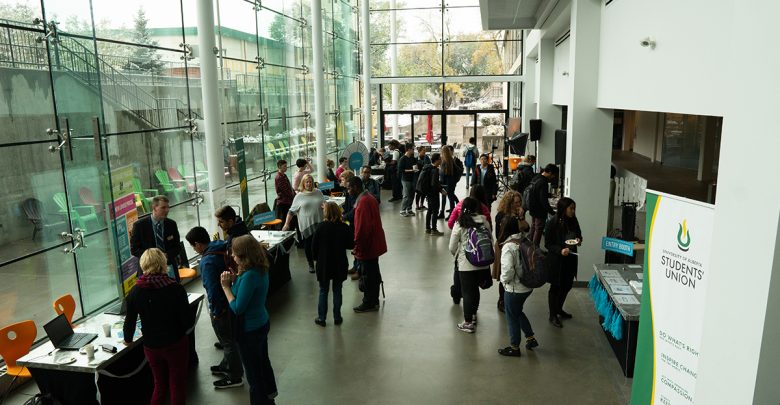Be Smart Book Fair finds plus side to new online format
The fair’s new online format has allowed “room for more voices,” says Students’ Union vice president (academic) David Draper.
 Richard Bagan
Richard BaganWith many events going online this year, the annual Be Smart Book Fair is following suit, a direction allowing the fair to expand in new ways.
In previous years, the Students’ Union organized event would have brought in different experts to share tips about the textbook buying process. This year the fair — which launches the second week of October, and will continue with events throughout the month — will include additional events that add elements the previous format couldn’t facilitate.
Online format leads to new opportunities
One new aspect of the online format are “lunch and learns,” videos that get in-depth about topics like open educational resources (OER).
Students’ Union vice-president (academic) David Draper — who is in charge of organizing this year’s book fair — recorded the lunch and learns earlier in September.
He shared that the online format has allowed for detailed, longform discussions, and for the chance to include people from outside of Canada.
“It’s allowed a lot of room for more voices outside of Alberta, and we were able to really get into a variety of topics,” he said. “In the more in-person affair, when you have a bunch of people coming in for quick 30 second lightning talks, you don’t get to have as much detail.”
Draper shared that the lunch and learns feature Michael McNally, a University of Alberta professor of library and information sciences, and Nicole Allen, the director of open education at the Scholarly Publishing and Academic Resources Coalition (SPARC), an international open education advocacy group.
One particularly interesting moment Draper is excited for students to see is Nicole Allen discussing the cancelled Cengage and McGraw Hill merger.
McGraw Hill and Cengage, two textbook companies that own a majority of the textbook market, were set to combine into one massive organization last year, causing concern about rising textbook prices.
Nicole Allen was part of an antitrust suit that prevented the merger from taking place.
“I got to ask her a lot of questions about what that process is, what that means for students, what that means for textbook costs,” Draper said. “[Our conversation] really showcases that there is a lot of advocacy happening that directly impacts the bottom line for students.”
Open education resources more critical than ever, said Draper
Draper shared that this year’s book fair and its focus on OER is especially important right now during a shift to online learning.
“There’s been a lot more critical conversations about open education and open pedagogy,” he said. “I was actually able to convince the Centre for Teaching and Learning (CTL) at the U of A to put open education resources directly on the list of best practices for this online semester which is a fantastic step.”
According to Draper, not only is OER adaptable to the specific needs of courses and students as learning goals change over time, OER can be important for its ability to diversify knowledge.
“Instead of knowledge that’s seen as the verified Western canon from a lot of publishers, [professors using OER] can actually tie information that might not be in a traditional textbook,” Draper said. “For example, they can take information from Indigenous resources and put that in the direct course material, which I think is a fantastic thing to do.”




